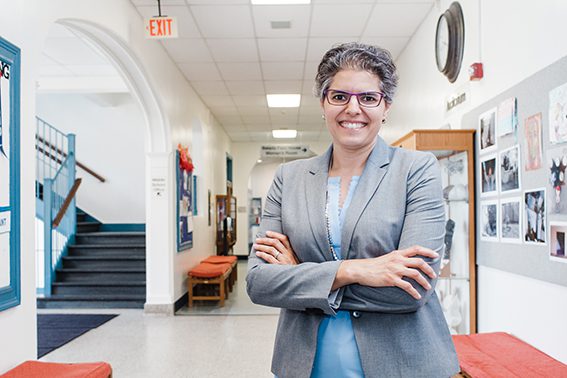Julia de la Torre

Julia de la Torre
Head of School, Moorestown Friends School
When education is personal
When Julia de la Torre was named Head of School at Moorestown Friends School 3 years ago, she considered it an incredible opportunity to help shape the future of a community so aligned to her values. Education, as she sees it, is as much about nurturing children’s ethical and spiritual growth as it is preparing them for college and careers.
When the pandemic hit, she says, that mission was put to the test, and MFS rose to the challenge.
“You go to school to prepare for college and a meaningful career. But you also go to school to find your voice around issues that matter to you, to learn who you are as a community member and to become the best version of yourself.”
“Independent schools like MFS were already really good at providing personalized support for students, but we’ve really had to lean into that,” says de la Torre, the first female head in the school’s storied history. “We have 640 kids, their families and 150 personnel who are all living in this same moment – but processing it differently. For some, it’s business as usual. Others think they should be in the business-as-usual mode, but they’re struggling. Still others are adjusting to having rejoined us in person for the first time in a year and a half. So they’re all at really, really different places in terms of how they’re reacting to the moment and processing their experiences.
“What I’ve learned from the pandemic,” she adds, “is you have to be connected to the people you serve in a way that helps you deeply understand the range of human needs.”
de la Torre’s career experiences prepared her for this moment. She was a rookie French teacher in Denver, Co. in 1999 when, at nearby Columbine High School, 2 students committed the deadliest school massacre in the country at the time.
“I had many conversations with kids whose sense of safety was shaken,” says de la Torre, a Haverford College graduate who has a master’s degree from the Harvard Graduate School of Education. “My thoughts were focused on how to support them and help them regain the sense of openness, comfort and confidence you want them to feel in school.”
She says 9/11 was another one of those moments when educators collectively were forced to consider how traumatic events can impact a child’s ability to learn. In reality, she says, students may confront trauma in their personal lives at different times, when there’s a death in the family, divorce or economic instability, for example. Schools must be able to meet kids where they are, she says. And at this moment of the pandemic, restoring students’ sense of safety is paramount.
“You go to school to prepare for college and a meaningful career,” says de la Torre. “But you also go to school to find your voice around issues that matter to you, to learn who you are as a community member and to become the best version of yourself.”

Learning and connecting through play
MFS recently opened a new, distinctive outdoor space where younger students can learn and connect with the environment, with other students and with themselves. In the fall of 2019, every Lower School student made a 3-D model of the ultimate outdoor playground. Kids, parents and educators were asked to describe their favorite memories of outdoor play. Those designs and examples were the creative spark that resulted in the school’s new Playscape.
“Our goal was to create an environment that stimulates creativity, independence and problem-solving in an innovative and exploratory setting,” says Head of School Julia de la Torre. “Building on our Quaker values, the new Playscape supports children to play collaboratively, resolve conflicts peacefully, and connect to the simplicity of nature and their responsibility as environmental stewards.”
It’s a Playscape with equipment but so much more, she adds.
“There are 2,600 plantings on the Playscape and 14 new trees,” de la Torre says. “There will be so much to observe and study through the seasons, about pollinators and native plants that sustain our natural world. This space doesn’t dictate how students play. They can engage with all these different opportunities in different ways.”

110 E. Main Street, Moorestown
856-235-2900 | Mfriends.org

